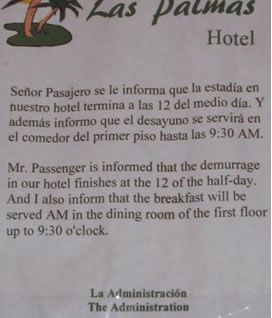Today we have a guest post by Paul Sawers, a Communications Executive at Lingo24.
As one of the few mono-linguists working for a very multi-lingual translation company (Lingo24 – even the programmers can speak at least two languages…), I certainly don’t think I’m in any less of a position to comment on some of the linguistic lapses that seem to be everywhere in society.
Indeed, whilst my rudimentary French and Spanish is probably enough to get me a room for a night in a Paris or Madrid hotel, my language skills pale in comparison to the Account Managers, Project Managers, IT specialists and marketing personnel I work with on a daily basis. And all this before we even begin to discuss all the trusted translators we work with.
But alas, whilst it has always been an ambition of mine to become proficient enough in Spanish so I can at least hold a decent conversation with a native Spaniard, it isn’t necessary for my job. I simply manage the English-language side of our communications.
Having been immersed in the translation industry for the best part of 6 months now, I certainly feel as though I’ve learned a lot about the industry. From simple things like the difference between a translator and an interpreter, to the importance of using qualified linguists rather than laypeople that just happen to be fluent in another language.
These may be things that many people take for granted, but for someone who has never worked in the languages industry, these are things I’d never really considered before.
But at any rate, the purpose of this post isn’t to dwell on life in a translation agency, it’s really more about how it’s made me more aware of other languages in general.
Lingo24 is regularly asked why someone should use a professional translation service when there is a plethora of software and free online translation tools widely available. Well, there are many examples which help to illustrate why machine translation tools perhaps aren’t the most reliable route to go down.
Last year, there was the restaurant in China that, whilst obviously trying to make its shop-front more appealing to the English-speaking world for the Summer Olympics, decided to use an online translation tool: ‘Translate Server Error’ was the resulting message, designed to ‘entice’ anglophiles through its doors.

And whenever I’m abroad now, I’m always on the lookout for dodgy translations. On a recent trip to South America, I was staying in a hotel in Arica, a small town in northern Chile.
There was a sign on the door of our hotel room which was designed to inform English-speakers of the check-out time and breakfast details.
I had to take a photograph of the sign, as it did make me laugh. Being referred to as ‘Mr. Passenger’, and the ‘demurrage’ finishing at ‘12 of the half-day’, certainly brightened my morning. But as easy as it is to mock online translation tools – which were evidently used on this occasion – what would the alternative have been?
My Spanish wasn’t great. And their English was roughly about the same. But they were considerate enough to take the time to provide a sign which DID get the message across, and saved me a great deal of time in terms of thumbing through my trusted Lonely Planet phrase book.
So, I guess my point is, there is a time and a place for online translation tools. And this situation clearly fitted the bill. But it also helps to confirm that for any business that is serious about its communications, machine translation tools perhaps aren’t quite up to the task.
A very good article on the pitfalls of relying on machine translations.
There is clearly a time and place for the use of machine translations. For example, it might be more cost effective to use this method of translation for non important internal documents where the user needs only a basic understanding of the subject matter.
However, we would always recommend the use of native human translators for businesses who wish to uphold a professional image both internally and externally. The use of machine translations in such cases could turn out to be costly for a business both on a financial and reputational level.
TransABC
Translation service provider for all languages
http://www.transabc.com